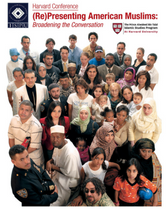
(Re)Presenting American Muslims: Broadening the Conversation
This report cites the findings of a workshop organized by the Alwaleed Islamic Studies Program and the Institute for Social Policy and Understanding on American Muslim identities and challenges. As American Muslims begin inward reflection during Ramadan, this report focuses on insights and recommendations from a diverse slate of American Muslim academics, activists, artists and advocates on how American Muslims can start to address key challenges in their own communities.
“This convening brought together a diverse brain trust of American Muslims for a much needed constructive and forward thinking dialogue,” said Meira Neggaz, Executive Director, ISPU. “While far too often the American Muslim community is talked about, this convening catalyzed discussion and problem solving among the community. We hope that this was the start of a conversation that will inspire future dialogue and action.”
Encouraging a broader view of the communities that constitute the category of “American Muslims,” the report examines the ways in which American Muslims define themselves, and are defined, in the twenty-first century. By drawing on the experience and expertise of the workshop participants, the report discusses the roles that American Muslim organizations, public servants and storytellers can play in countering negative stereotypes and advancing a positive image of American Muslims.
The report identifies several key findings, which include:
- American Muslim-led organizations face critical issues regarding structural sustainability and infrastructure, and continuity and relevance to younger generations. In order to flourish and serve American Muslims, they need to develop leadership curricula and training programs, pursue multi-pronged and inclusive approaches, and partnering opportunities to increase bandwidth.
- Irresistible, true and complex stories told from diverse perspectives are key to changing the ways that American Muslims are perceived by the wider American society; American Muslims need to encourage and empower cross-generational storytelling through scholarships, fundraising and patronage. “Communicating through the arts, including storytelling is very important, and a wonderful way to humanize and highlight the Muslim experience without diluting it.”
- As more American Muslims enter government (elected and appointed) careers, American Muslim communities must demonstrate their support of this vital public service through increased contributions of time and money.
- Creating inclusive spaces and communities starts with strong leaders who are willing to meet people ‘where they are at’ not ‘where they should be.’ Promoting active engagement through making space for women, being more inclusive of the poor, and developing a theological framework of inclusion are important for making sacred and safe places for American Muslims to learn, worship, and grow.
- To move towards more inclusion and plurality in American Muslim communities, third spaces and social media can provide the necessary room for dialogue, opening up conversations and pushing questions and ideas.


